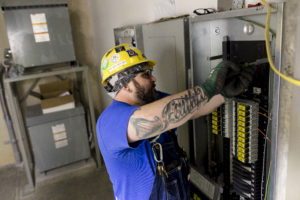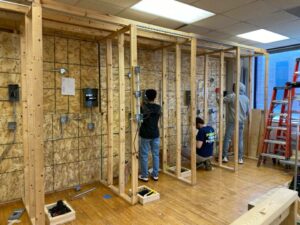With the demand for qualified electricians exceeding the supply, now is the perfect time to begin a lucrative career as a licensed electrician.
According to the Bureau of Labor Statistics, the electrical field is expected to experience 7% growth by 2028, adding approximately 73,500 residential, commercial, and industrial electrician positions annually.
Similarly, electricians working within the renewable energy space will experience a little over 7% growth, or 80,000 openings per year, by 2031.
It’s an exciting time to be an electrician. And the field’s incredible flexibility makes it an even more desirable time to launch your lucrative electrical career.






Specializing can lead to greater job satisfaction, increased flexibility, and higher pay. Building Omaha helps students through its apprenticeship program, as well as already qualified electricians, explore the path tailored to their talents and career goals.
Jason Regan recently completed Building Omaha’s apprenticeship program and says he “hands down would recommend the program to anyone” because you will “walk away with zero debt, great pay, job security, and a skill that will travel with you.”
“I’ve been working out in the field for the last five years, working alongside the pros getting hands-on experience while putting my classroom training to the test. I came in with zero industry experience, but the program gave me the confidence to grow as an electrician and an individual,” he continues.
Whether you are you a recent high school graduate wanting an educational alternative to college or already a member of the workforce seeking a change, Building Omaha offers personalized guidance and support to achieve your dream career. Applying to the apprenticeship program is straightforward. So, too, is propelling your career to new heights. Reach out today for a promising tomorrow.
Building Omaha is a partnership between the National Electrical Contractors Association (NECA) and the International Brotherhood of Electrical Workers (IBEW). Together, we power Omaha.